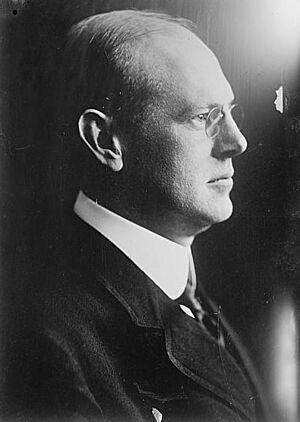Ernest Fox Nichols facts for kids
Quick facts for kids
Ernest Fox Nichols
|
|
|---|---|
 |
|
| 10th President of Dartmouth College | |
| In office 1909–1916 |
|
| Preceded by | William Jewett Tucker |
| Succeeded by | Ernest Martin Hopkins |
| 7th President of the Massachusetts Institute of Technology | |
| In office 1921–1922 |
|
| Preceded by | Elihu Thomson (acting) |
| Succeeded by | Samuel Wesley Stratton |
| Personal details | |
| Born | July 1, 1869 Leavenworth, Kansas |
| Died | April 29, 1924 (aged 54) New York City, New York |
| Education | Kansas State University (BS) Cornell University (MS), (D.Sc.) |
Ernest Fox Nichols (born June 1, 1869 – died April 29, 1924) was an important American educator and physicist. He was known for his work in physics and for leading two major universities. He served as the 10th President of Dartmouth College. Later, he also became president of the Massachusetts Institute of Technology (MIT).
Contents
Early Life and Education
Ernest Fox Nichols was born in Leavenworth County, Kansas. He earned his first college degree from Kansas State University in 1888. After working there for a year, he went to graduate school at Cornell University. He received more degrees from Cornell in 1893 and 1897. He also studied at famous universities like the University of Berlin and Cambridge University.
A Career in Physics and Education
Nichols started his career as a physics professor. He taught at Colgate University from 1892 to 1898. Then he moved to Dartmouth College, where he taught from 1898 to 1903. After that, he taught at Columbia University until 1909.
Awards and Recognition
In 1905, Nichols received the Rumford Prize. This award was given by the American Academy of Arts and Sciences. He earned it for proving that light actually pushes on things. The next year, he was chosen to be a member of the American Philosophical Society. He also became the Vice President of the National Academy of Sciences. Many future scientists, like Frederic Columbus Blake, looked to him for advice. His own PhD adviser was Edward Leamington Nichols.
Leading Universities
Ernest Fox Nichols became the President of Dartmouth College in 1909. He led the college until 1916. Later, in 1921, he took on the role of president at the Massachusetts Institute of Technology (MIT). However, he became very ill with heart disease during his time at MIT. Because of his health, he had to step down in 1922.
His Final Days
On April 29, 1924, Dr. Nichols was at an event in Washington, D.C. He was giving a speech at the opening of a new building for the American Academy of Sciences. Sadly, he collapsed during his speech and passed away.
Dartmouth College Presidency
When Ernest Fox Nichols became the 10th president of Dartmouth College, it was a special moment. He was a physics professor and the head of the physics department. His work in measuring radiation was very important at the time. He was the first Dartmouth president since John Wheelock who was not a member of the clergy (a religious leader). However, he deeply believed that learning many different subjects helped students grow.
New Traditions and Clubs
Many beloved traditions and groups at Dartmouth started during Nichols' time as president. These include the Dartmouth Outing Club, which helps students enjoy outdoor activities. The famous Dartmouth Winter Carnival also began during his leadership. To help Dartmouth stay connected with its former students, President Nichols also created the Dartmouth Council of Alumni.
After leaving Dartmouth in 1916, Ernest Fox Nichols became a physics professor at Yale University. Later, he became president of the Massachusetts Institute of Technology.
See also
- Nichols radiometer
 | Janet Taylor Pickett |
 | Synthia Saint James |
 | Howardena Pindell |
 | Faith Ringgold |

